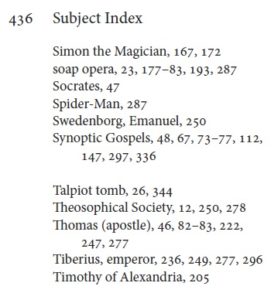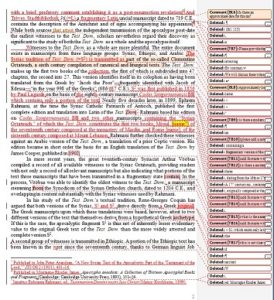Editing More Christian Apocrypha, Part 2: Advice for Young Scholars
This past Spring I sat on a panel for students at the Canadian Society of Biblical Studies annual meeting entitled “Review, Respond, Reflect.” I was asked to discuss my experiences editing the work of other scholars. I included some tales (many of which were cautionary) from my experience editing the two MNTA volumes, as well as from my other editing projects: the three York University Christian Apocrypha Symposium collections, and Rediscovering the Apocryphal Continent (co-edited with Pierluigi Piovanelli).I thought it might be useful to include the advice I gave to the students and young scholars in this short series of posts on editing MNTA vol. 2. My comments were somewhat candid, so I won’t repeat them all here (and even so I’m a little worried that what I do say could offend some).
1. To edit or not to edit
When my colleagues ask me what I’m working on and I tell them about editing projects, they respond with pity and some statement along the lines of “better you than me.” Edited volumes are universally (throughout the scholarly world, not just in Religious Studies and related disciplines) considered unpleasant and extremely frustrating experiences that come with little reward, because most universities don’t count assign them much weight in their calculations for tenure and promotion. I contend, however, that they do have value.

For grad students or junior scholars the first exposure to editing likely would come from working with an advisor or colleague on indexing a volume. This is considered grunt work that no editor wants to do (often they will even pay out of pocket to hire someone to do it), but if you have an OCD-level of attention to detail and organization, you might even enjoy it. The experience also gives you a sense of some important aspects of editing, such as the need to have everyone involved in the volume use the same editions of primary texts, if possible (so that chapter and verse divisions are standard throughout), and the difficulties of compiling a subject index (if you’re really thinking ahead, you will tell everyone to submit their own list of terms). Editing might even provide an opportunity to interact with some of the contributors, which helps establish contacts with scholars in one’s own corner of the field. This works too for junior scholars ready to edit a volume of their own; I suspect there is a larger number of junior scholars doing this kind of work than senior scholars, because senior scholars know not to do it! Nevertheless, it is a good opportunity to become established in the field; I attribute my (limited) fame more to my editing projects than my own scholarship.
2. Choose your contributors and co-editors carefully
Ideally, you want to work with people who feel as much passion for the project as you do. I’ve heard plenty of stories from my colleagues of working with co-editors who take a long time to complete their share of the work, or just don’t pull their weight. The same can be said about contributors. Students would be shocked to find out that the professor who is a hard-ass about essay format and deadlines in class is the same person who is consistently late and sloppy with their own work. (I should add that I am be no means perfect, though at my worst I have been late only by a few weeks or so—unless you count those three books on my desk that were supposed to be reviewed ages ago). Despite the fact that publishing is part of our jobs as scholars, and that editors provide scholars with opportunities to showcase their work (and to attend a conference, if the volume is a proceedings collection), some see edited volumes as low on their priority list when work starts to pile up and deadlines loom. And, again, this is due to perceptions of value: non-refereed publications are not considered as important as those that are refereed (though I would argue that editors serve as referees in this context). To be fair, sometimes the delays are due to demands on scholars time from outside of work; junior scholars in particular have to juggle caring for young children, heavy course loads, and the need to publish their dissertations.
I have had contributors drop out of projects and hold up projects for months (even years!). As a result I am reluctant to work with these people again; and likely there are some people who, fed up with my pestering, would rather not work with me. The lesson from all this is to have backup plans for when (not if) people drop out of projects, or simply expect that some conference presentations will not make it to publication. Constant contact is a good idea, reminding people of deadlines and offering to help along the way (at least they will know that the project is still going ahead and will give some thought to working on it). I should add that I have worked with some wonderful people—they make deadlines, are gracious about suggestions for improvement, and consult on other contributors’ work for the project; it is those people who I will come back to again and again to collaborate with and recommend to others.
Grad students can also be involved with edited volumes as contributors. I believe that it is important to offer students opportunities to advance their careers. The final York Symposium included two papers by students and the MNTA volumes feature numerous contributions from students: vol. 1 includes the Epistle of Christ from Heaven by Calogero Miceli (Concordia University), P. Oxy. 5072 by Ross Ponder (formerly of University of Texas at Austin), the Dialogue of the Paralytic with Christ by Bradley Rice (McGill University), and two contributions (the Life of John the Baptist by Serapion and, with me, the Legend of the Thirty Pieces of Silver) from Slavomír Céplö (Comenius University, now graduated); and vol. 2 includes another text by Bradley Rice (the Story of Joseph of Arimathea) and a number partnerships between established scholars and students: Brent Landau with Bradley Rice on the Epistle of James to Quadratus, Hugo Lundhaug and Lloyd Abercrombie (University of Oslo) on the Investiture of Michael, me and Chance Bonar (Harvard University) with Slavomír Céplö on 3 Apocryphal Apocalypse of John, me and Sarah Veale (York University) on the Martyrdom of Zechariah, and Janet Spittler with Jonathan Holste (University of Virginia) on the Acts of Thomas and His Wonderworking Skin and with Jeannie Sellick and Rebecca Draughon (University of Virginia) on 2 Apocryphal Apocalypse of John. I’m quite happy that the volumes have been produced in the spirit of mentoring that is expected of established scholars.
3. Break it to them gently
In my earlier projects, I was a far more demure editor, gently asking for as few corrections as possible. And to be sure no-one (myself included) wants to hear that the essay they wrote last year needs correction or adjustment or expansion; we want to be done with it and move on to the next project. I feel terrible about going back to contributors to make changes because delays due to other contributors’ tardiness has necessitated updating their work to take into account new scholarship (see item 2 above).

Over the years I have become more bold about the changes I want made, and I think I get away with it because I’m now a senior scholar. But I also make many of the changes myself. There are two approaches to editing: the minimalist and the maximalist. A minimalist editor will give contributors instructions to make changes (e.g., change hyphens to en-dashes, or add this or that particular scriptural parallel), a maximalist will just do it and send the changes back to the author for acceptance (and really, it can take just as long to ask for the change as to just do it yourself). Too many changes, however, can be a problem. I had one contributor to MNTA vol. 1 pull out, I think (we just don’t know; she stopped answering our emails), because of the large amount of revisions we asked for (mostly because we are quite finicky about formatting and arrangement of content); the file we sent her back was overwhelming in the amount of changes that showed up in Track Changes in scary red type. I have changed my approach now to make format changes (like those pesky en-dashes, changing verse numbers to superscript, etc.) before turning on Track Changes, and to “okaying” my changes if they are minimal. The contributor then mostly sees some underlined text and whatever comments and questions that I think are necessary to address. Doing most of the changes also means you have less time to wait for contributors to return revised versions of their papers.
In all there is plenty about editing other scholars’ work that is frustrating, time-consuming, and perhaps even downright dangerous for your career and social life (working with friends can be rough), but it does have its rewards: it gets you known in your field quicker than churning out papers and monographs, it gives you a variety of work experiences, and you become intimately connected to the work of your colleagues. It may not “count” to tenure and promotion committees, but it can be very rewarding when it comes to career building. One last caution: once you become known as an editor, you keep getting asked by publishers to do more. Some editing is good, but too much gets in the way of your own scholarship. And after spending months correcting comma splices and split infinitives, it is really invigorating to simply sit at my computer and write for a change.
